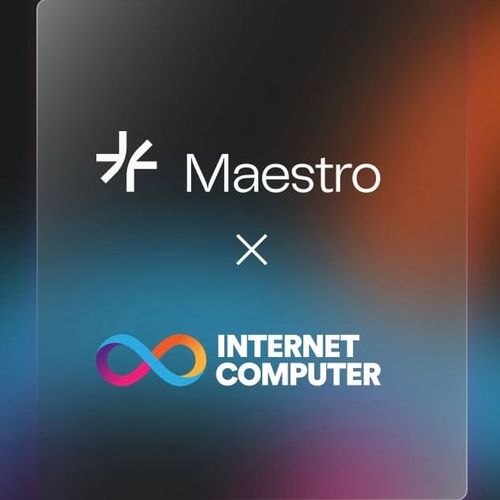Maestro & ICP Unlock Bitcoin’s DeFi Future With Ordinals, Runes & Cross-Chain Lending
🔗 Bitcoin DeFi, Upgraded: Maestro & ICP Are Building Native BTC Infrastructure
Real-time data. Native integration. No bridges. No wrappers.
📌 Quick Overview
- 🤝 Partnership: Maestro x Internet Computer Protocol (ICP), supported by DFINITY
- 🛠 Use case: Indexing for Ordinals & Runes with direct Bitcoin integration
- 💡 Highlight: Liquidium enables instant BTC-to-USDT loans — no bridges involved
- 📈 BTCFi TVL: 7B+ (up from 300M in early 2024)
- 👨💻 Developers using Maestro: 1,000+
- ⚙️ Tech: ICP’s Chain Fusion for native cross-chain functionality
🧱 Bitcoin Is Becoming More Than Digital Gold
Bitcoin is evolving — not through core protocol changes, but through smart, external infrastructure.
The latest step? Maestro, an enterprise-grade infrastructure provider for Bitcoin DeFi (BTCFi), is partnering with ICP to power native indexing for Bitcoin-based assets — all without bridges or wrapped tokens.
Thanks to ICP’s 🔗 Chain Fusion tech, Bitcoin can now interact directly with Ethereum and other chains — trustlessly.
⚒️ What’s Actually Being Delivered
This isn’t vaporware. The Maestro-ICP partnership delivers:
- ⚡ High-throughput indexer for Ordinals & Runes
- 🧠 Mempool-aware updates — immune to chain reorganizations
- 🔐 BTC-native validation inside ICP smart contracts (canisters)
- 🧰 Open-source dev tools for building BTCFi apps
Liquidium will be the first to integrate: users can lock BTC on Layer 1 and borrow USDT on Ethereum — no bridges, no wrapped tokens, no custodians.
🧬 Ordinals and Runes, in Plain English
- 🧾 Ordinals: like NFTs, but on individual satoshis
- 🪙 Runes: fungible tokens on Bitcoin, no smart contracts required
These two protocols unlock native programmability on Bitcoin — but without proper indexing, they’re hard to use in real-world apps.
Maestro solves that with real-time access for apps in DeFi, collectibles, gaming, and more.
“This is a leap forward for developers building on Bitcoin,” says Marvin Bertin, CEO of Maestro. “It’s about unlocking native programmability without compromising decentralization.”
🌐 Why This Changes the Game
Bitcoin DeFi (BTCFi) is no longer a sandbox. With over 7B+ locked, it’s growing — fast.
Yet until now, building BTC-native apps meant dealing with:
- ⛓️ Centralized bridges
- ♻️ Wrapped tokens
- 🐌 Slow, unreliable data
The Maestro x ICP stack changes that. Developers get:
- 🔓 Direct access to BTC-native protocols
- 🧠 Smart contract compatibility via ICP canisters
- 💼 Institutional-grade performance without workarounds
“We’re enabling trustless access to the full data stack of Ordinals and Runes,” — Lomesh Dutta, VP of Growth at DFINITY
🚀 What’s Next for BTCFi
Bitcoin wasn’t built for smart contracts — but now, it doesn’t have to be.
Thanks to:
- ⚡ Real-time indexing
- 🔗 Native cross-chain integration
- 🧠 Open-source tools
…developers can launch BTC-native applications that are fast, decentralized, and composable by design.
🔮 Expect:
- 💸 Lending apps collateralized in BTC
- 🧾 Tokenized assets directly on satoshis
- 🎮 Gaming and collectibles running natively on Bitcoin
This isn’t just an upgrade. It’s a new paradigm for what’s possible with Bitcoin.
TL;DR
Maestro and Internet Computer (ICP) are building real infrastructure for Bitcoin DeFi. With native indexing for Ordinals and Runes — plus smart contract support via Chain Fusion — apps like Liquidium can offer cross-chain lending with no bridges or wrappers. With 7B+ in BTCFi already, this move positions Bitcoin to compete head-on in the multi-chain DeFi future.

Recent News
All Time High • Live
Have questions or want to collaborate? Reach us at: [email protected]










